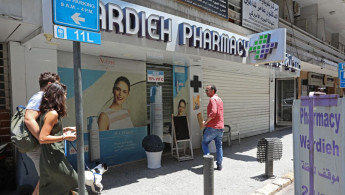Lebanon ends medicine subsidies, piling financial pressure on citizens
Lebanon’s Ministry of Public Health began lifting medication subsidies on Tuesday, putting more financial pressure on some of the country's most vulnerable citizens.
Health Minister Firass Abiad announced last week that subsidies on medication used to treat common, chronic conditions would be lifted gradually.
New prices for heart disease, high cholesterol and high blood pressure medicines were revealed on Monday. Pharmacists began implementing the new prices the next day.
The price of some drugs has increased five or six fold as a result.
“I would say 90 per cent of parents asking for baby formula today left my pharmacy empty-handed. They simply didn’t have the money to pay for it,” one Beirut pharmacist told The National.
Lebanese citizens have been struggling for months as their country’s economy crumbles and the value of the local currency has collapsed. About 80 percent of the population is living below the poverty line, according to UN data.
Representatives from the health ministry said that medicines for cancer, mental and psychological diseases, and terminal diseases would remain subsidised, as would drugs used in hospitals, according to the Emirati news outlet.
The latest subsidy cut has affected the price of other basic supplies.
Baby formula was previously sold for 12,000 Lebanese pounds, but will today set parents back 98,000 pounds.
The cut will save the Lebanese state around $95 million, Health Minister Abiad said last week.
The lifting of medication subsidies is the latest in a series of money-saving measures imposed by the government, and follows cuts in subsidies for essentials including petrol, electricity, and bread.
Lebanon is hoping to secure financial support from the IMF and foreign nations, who have made political progress a condition of funding.





 Follow the Middle East's top stories in English at The New Arab on Google News
Follow the Middle East's top stories in English at The New Arab on Google News
![Both Hamas and the Palestinian Authority welcomed the ICC arrest warrants [Getty]](/sites/default/files/styles/image_330x185/public/2024-11/GettyImages-2178351173.jpg?h=199d8c1f&itok=TV858iVg)

